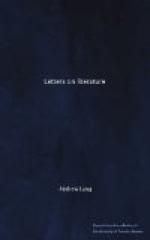Let it be admitted that “In Memoriam” has certain lapses in all that meed of melodious tears; that there are trivialities which might deserve (here is an example) “to line a box,” or to curl some maiden’s locks, that there are weaknesses of thought, that the poet now speaks of himself as a linnet, singing “because it must,” now dares to approach questions insoluble, and again declines their solution. What is all this but the changeful mood of grief? The singing linnet, like the bird in the old English heathen apologue, dashes its light wings painfully against the walls of the chamber into which it has flown out of the blind night that shall again receive it.
I do not care to dwell on the imperfections in that immortal strain of sympathy and consolation, that enchanted book of consecrated regrets. It is an easier if not more grateful task to note a certain peevish egotism of tone in the heroes of “Locksley Hall,” of “Maud,” of “Lady Clara Vere de Vere.” “You can’t think how poor a figure you make when you tell that story, sir,” said Dr. Johnson to some unlucky gentleman whose “figure” must certainly have been more respectable than that which is cut by these whining and peevish lovers of Maud and Cousin Amy.
Let it be admitted, too, that King Arthur, of the “Idylls,” is like an Albert in blank verse, an Albert cursed with a Guinevere for a wife, and a Lancelot for friend. The “Idylls,” with all their beauties, are full of a Victorian respectability, and love of talking with Vivien about what is not so respectable. One wishes, at times, that the “Morte d’Arthur” had remained a lonely and flawless fragment, as noble as Homer, as polished as Sophocles. But then we must have missed, with many other admirable things, the “Last Battle in the West.”
People who come after us will be more impressed than we are by the Laureate’s versatility. He has touched so many strings, from “Will Waterproof’s Monologue,” so far above Praed, to the agony of “Rizpah,” the invincible energy of “Ulysses,” the languor and the fairy music of the “Lotus Eaters,” the grace as of a Greek epigram which inspires the lines to Catullus and to Virgil. He is with Milton for learning, with Keats for magic and vision, with Virgil for graceful recasting of ancient golden lines, and, even in the latest volume of his long life, “we may tell from the straw,” as Homer says, “what the grain has been.”
There are many who make it a kind of religion to regard Mr. Browning as the greatest of living English poets. For him, too, one is thankful as for a veritable great poet; but can we believe that impartial posterity will rate him with the Laureate, or that so large a proportion of his work will endure? The charm of an enigma now attracts students who feel proud of being able to understand what others find obscure. But this attraction must inevitably become a stumbling-block.




